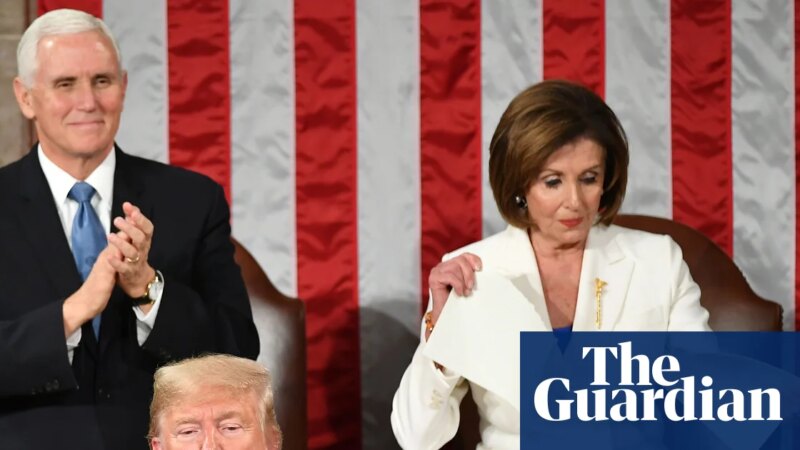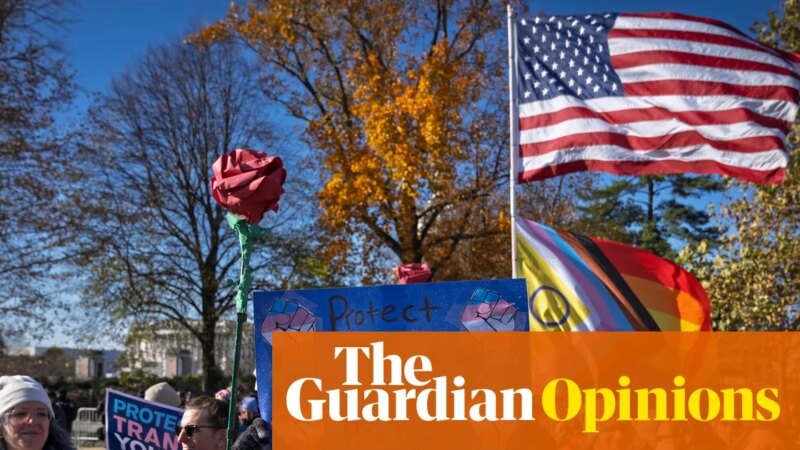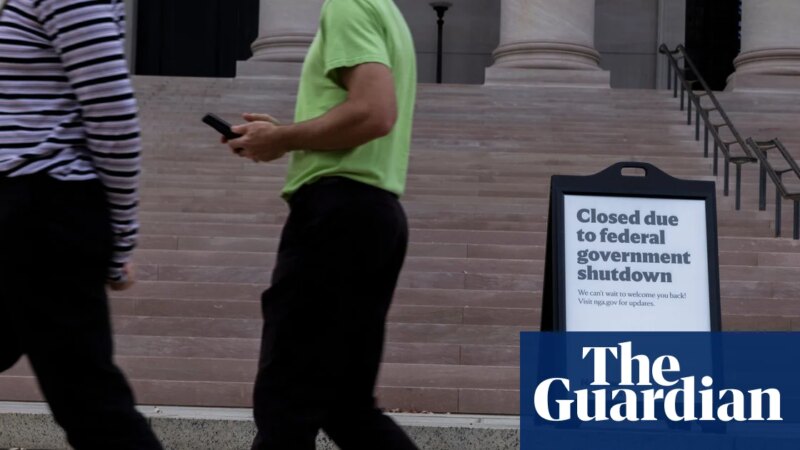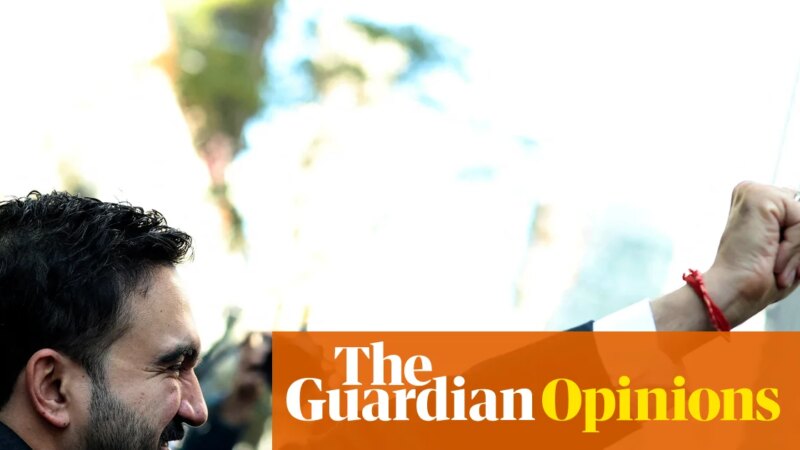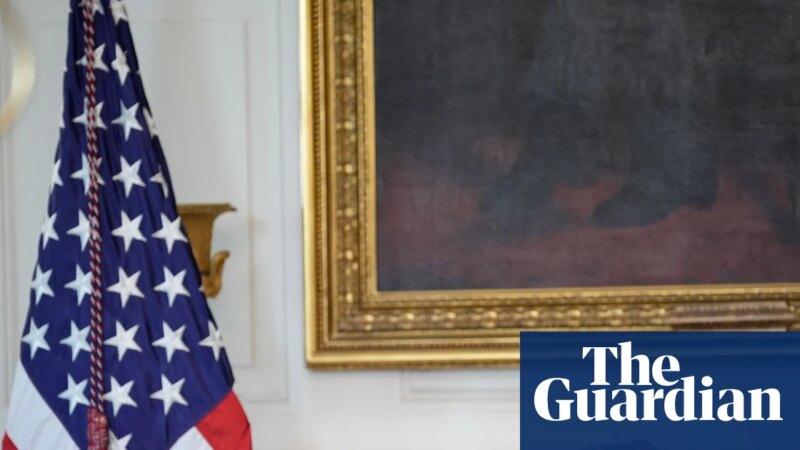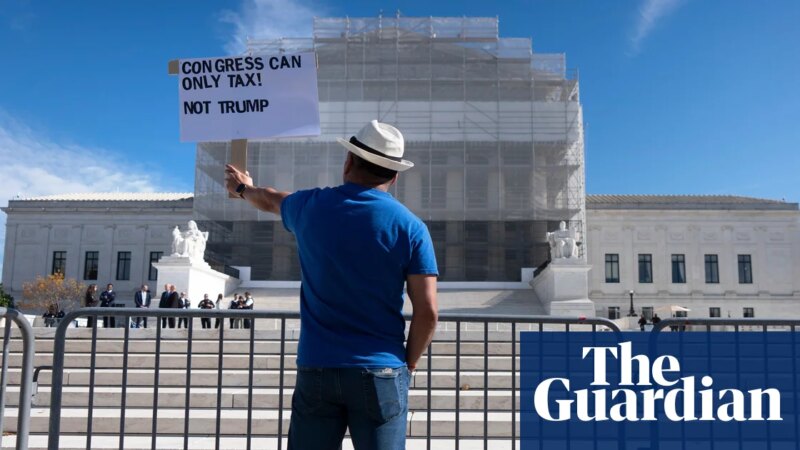US non-profits ‘lock arms’ amid Trump’s menacing of George Soros: ‘We will not be intimidated’ | US news
When Donald Trump named leftwing billionaire George Soros as the next on his growing list of targets for retribution, he was also targeting the long list of progressive causes that Soros funds.
Soros’s Open Society Foundations (OSF) network, now run by his son Alex, is a major funder of non-profits large and small, across sectors including democracy, voting rights, climate justice, racial justice, Palestinian rights and higher education. Public documentation of the group’s grant-making shows thousands of worldwide recipients receiving anywhere from small amounts to multimillion-dollar grants, and include major non-profit organizations like the American Civil Liberties Union.
The US justice department has reportedly instructed US attorneys to come up with plans to investigate OSF as efforts to attack the left accelerate following the killing of rightwing commentator Charlie Kirk. In a presidential memo, Trump said the government needed to “investigate and disrupt networks, entities, and organizations that foment political violence”, adding a comment that Soros was at “the top of everything”.
“We have always and will continue to adhere to our rigorous compliance practices and operate within the bounds of the law while also refusing to surrender our legal and constitutional rights to free speech, association, due process, and the rule of law without challenge,” an OSF spokesperson said.
The menacing of Soros comes as part of Trump’s wider agenda to defeat progressive non-profits. This month, sources told Reuters that the US president plans to deploy the nation’s counter-terrorism apparatus – including intelligence agencies, the justice department, the Internal Revenue Service and the treasury department – against some leftwing groups it claims are backing political violence.
In May, Republican lawmakers also attempted to add language to Trump’s spending act, the so-called “big beautiful bill”, that could strip organizations deemed to be “terrorist-supporting” of their non-profit status. And in July Ted Cruz, a senator of Texas, introduced the Stop Financial Underwriting of Nefarious Demonstrations and Extremist Riots (Stop Funders) act, which would empower the justice department to prosecute groups that officials have deemed to be coordinating or supporting violent riots.
Last month, Trump announced that he was designating “antifa” – the decentralized, leaderless antifascist movement – a “terrorist organization”.
In its statement, OSF also said it “unequivocally” condemns terrorism and does not fund it, noting that its grantees “are expected to abide by human rights principles and comply with the law”. In the US, the organization noted, it funds work to strengthen democracy and uphold constitutional freedoms.
“These accusations are politically motivated attacks on civil society, meant to silence speech the administration disagrees with and undermine the first amendment right to free speech,” the statement said. “When power is abused to take away the rights of some people, it puts the rights of all people at risk.”
Trump’s unsubstantiated claims that Soros’s money aids “leftwing terrorism” provided more specificity to a threat that liberal non-profits have been planning for since his election victory last year: a crackdown on their organizations and major Democratic funders designed to intimidate them from carrying out their work, waste their time with investigations and ultimately hobble the opposition.
“When the White House or other government agencies, like the IRS, target non-profits for political reasons, it forces these orgs to spend their resources – staff focus, time, money – responding to attacks, instead of working towards their missions, and it threatens all the work they do,” said Diane Yentel, president and CEO of the National Council of Nonprofits.
Soros has long been a shared foe for rightwing leaders worldwide, who often draw on antisemitic stereotypes in their attacks that paint him as a shadowy, foreign billionaire seeking to undermine western civilization by supporting liberal causes and minority rights.
“For years, George Soros has been attacked by people who oppose open society values,” OSF’s spokesperson said. “They do not want to see a world where the human rights of all are respected, where democracies hold governments accountable, where there is free expression to promote pluralism and debate.”
The Guardian talked with non-profits across sectors that Trump has deemed dangerous, and which OSF has funded, to understand how activism could be affected as attacks on Soros intensify and to see how they are reacting. Some groups have been directly named by rightwing Trump allies; others have not yet been targeted directly but are bracing for impact.
Palestine
The justice department’s instructions to US attorneys to investigate OSF reportedly cited as evidence a report by Capital Research Center, a rightwing group monitoring the funding of liberal non-profits. The group’s head admitted to the New York Times this month that the paper does not include evidence that the Soros network had committed any crime.
The 72-page report, which claims Open Society Foundations gave more than $80m to what it calls “pro-terror” groups, lists dozens of organizations, including some of the most prominent Palestinian-rights groups in the US and abroad.
The report accuses the groups of “assisting domestic terrorism and criminality” by supporting US protest movements, of “endorsing” the 7 October 2023 Hamas attacks, or of working with “pro-terrorism” groups and activists. It lists some of the leading groups in the Palestine solidarity movement in the US, like Jewish Voice for Peace, the US Campaign for Palestinian Rights, and the Center for Constitutional Rights. It also lists Palestinian human rights groups in Palestine and US groups working on other issues that have expressed solidarity with Palestinians, like the Movement for Black Lives and the Sunrise Movement.
The OSF spokesperson called the Capital Research Center report “fundamentally flawed”.
“It relies on incomplete data, guilt by association and irresponsibly equates protected political speech with terrorism,” they said. “The authors never contacted us for verification, and have quietly changed their inflammatory title accusing us of funding terrorist groups – effectively admitting their accusation was false. Open Society has rigorous compliance processes and only funds peaceful and lawful work advancing human rights, democracy, and justice. Our grantees are obliged to follow the law.”
Stefanie Fox, Jewish Voice for Peace’s executive director, called the Capital Research Center report “paranoid, outlandish, baseless”.
“The hyper focus on Soros plays on antisemitic conspiracy theories that suggest that a shadowy cabal of wealthy Jews are controlling politics and are responsible for society’s ills,” she added. The US Campaign for Palestinian Rights did not respond to a request for comment.
While the accusations at the core of the report are largely baseless, the report does capture the landscape of civil society groups most prominent in the movement for Palestinian rights.
“OSF has been funding a range of organizations working on Palestine solidarity. They’ve always been one of the big sources of funding for this group,” said Rebecca Vilkomerson, a former executive director of Jewish Voice for Peace and author of two reports about philanthropy and the Palestinian freedom movement.
Vilkomerson noted that the movement has always been “hard to fund” – particularly in the US, due to its stigmatization and fear on the part of donors.
Attacks on the funding of Palestinian solidarity groups preceded the Trump administration, said Leena Barakat, president and CEO of Women Donors Network. In 2024, Barakat, who is Palestinian American, launched the Block and Build Funder Coalition, a network of nearly 175 funders, after Republican legislators called on the treasury department to investigate the funders of a series of groups involved in what they described as “pro-Hamas, antisemitic, anti-Israel, and anti-American protests”.
She also noted that while OSF has traditionally been one of the most significant institutional funders backing Palestine solidarity groups, the movement has never received much institutional backing, forcing it to diversify its funding streams.
“So attacking that funding plays a big role, but does not significantly shift the capacity for the movement to do the work that the movement has always done,” she said.
Still, Barakat cautioned: “The Palestinian movement – they are our canaries. What they test on the Palestinian movement are strategies that will eventually impact all other movements.”
after newsletter promotion
Democracy and resistance
OSF funds a long list of non-profits focused on democracy issues, voting rights and civic engagement around the globe. In the US, these grants also include policy advocacy and electoral goals; some ballot measure campaigns have gotten support, as have political action committees.
Some groups that have received funding from OSF are signed on as partners of a mass day of protest set for 18 October , dubbed No Kings, the second iteration of a mass demonstration across the US under that name. Of the more than 200 organizations who are part of the action, none has dropped out, despite Trump promising to crack down on peaceful opposition, said Ezra Levin, the co-founder of Indivisible, the progressive resistance group. Making these actions as big as possible shows that non-profits and the people they serve won’t be intimidated by Trump’s threats.
Indivisible, which started in 2017, has received OSF funds over the years, and the group hasn’t shied away from talking about it – they’ve been called “Soros-funded Astroturf” by many on the right since their inception, Levin said. Levin said it wouldn’t surprise him if Republican leaders tried to “make up some bogus shit” to go after the group.
“I will say because I believe we are squeaky clean, and we believe that we’re under a microscope for our entire existence, we do basically everything we do out in the open,” he said. What worries him more is the potential for violence if they’re targeted.
These threats of investigations or criminal charges take their toll, though – mostly in the form of wasting the time and money responding to them, which distracts from the organizations’ missions, part of Trump’s goal of hobbling the opposition. Many of the organizations are specifically tasked with protecting the people being targeted by Trump, including immigrants and LGBTQ+ people. Others are well-versed in the playbooks of autocratic leaders, so they haven’t been surprised by Trump’s threats against civic groups.
The Center for American Progress (CAP), a progressive thinktank that has received funding from OSF, said the Trump administration’s attacks on the funder are “the tip of the spear” and part of a systematic attempt to silence those who disagree with the president so he can consolidate power.
“We’ve seen time and time again over the past nine months that the best way to stop Trump is to speak out and fight back,” said Ben Olinksy, CAP senior vice-president of structural reform and governance. “CAP is locking arms with a broad group of foundations and non-profits around the country who stand for the same principles we do around building a stronger and more democratic America.”
Groups have learned lessons from watching other sectors – like higher education, media and the legal industry – capitulate to Trump, so they’ve been having conversations for months about how to band together and speak deliberately as a collective, the leader of one non-profit working in the democracy space said. Smaller organizations with fewer resources to handle legal challenges will be able to draw upon the legal network of the bigger organizations, said the leader, who was granted anonymity to speak candidly about these attacks.
“Because Soros has a very strong posture in fighting, that makes everybody else stiffen their spine who’s connected to them in any way,” they said.
The groups have also learned that being quiet will not serve them, multiple leaders said. They have set their posture more as, if he goes after one of us, treat it like an attack on all and respond accordingly.
“I think you’re in many ways safer the more out there you are,” Levin said. “Because if they can quietly come after you, they absolutely will.”
Climate justice
Since re-taking the White House, Trump has often intimidated climate-focused groups. Around Earth Day in April, rumors swirled that he would revoke the tax-exempt status of green non-profits. Now, green organizations are concerned the targeting of Soros could put their budgets at risk.
OSF last year committed $400m over eight years to sustainably grow global south economies and allotted additional funds to green infrastructure in the US. The foundations have also donated millions to climate and environmental non-profits with a wide range of political views and beliefs. They range from big green-policy organizations, to groups focused on uniting labor and environmental causes, to groups connecting survivors of climate disasters.
The Trump administration’s crackdown will not deter OSF from working to promote “economic and climate prosperity”, the OSF spokesperson said.
One beneficiary of OSF funding has been the progressive youth-led climate justice group Sunrise Movement, which was named in the Capital Research Center’s September report for its support of a legal defense fund associated with the decentralized movement to stop the controversial “Cop City” police-training facility in Atlanta. In 2018, Sunrise popularized calls for a Green New Deal. From 2019 to 2023, the group received $2.1m from OSF. Aru Shiney-Ajay, executive director of the Sunrise Movement, called Trump’s threats “textbook authoritarianism”.
“Trump is targeting grassroots orgs in an attempt to silence peaceful dissent against his dangerous and unpopular agenda, whether it’s TV hosts or non-profit organizations like ours,” she said, referring to Trump’s attacks on late-night TV talkshow host Jimmy Kimmel.
While the report baselessly refers to the Stop Cop City protesters as “terrorists”, most of the charges against them were dropped last month.
The report is “misguided and dangerous”, Shiney-Ajay said.
“Sunrise has always been a movement of young people that engages exclusively in peaceful, nonviolent activism advocating to stop the climate crisis and secure a livable future,” she said. “This so-called report from Capital Research Center is filled with baseless claims clearly designed to give the administration pretext to silence progressive organizations they view as threats to their agenda.”
This month, Sunrise announced it will expand its focus from climate-justice efforts to broader actions to fend off authoritarianism.
“Sunrise will not be intimidated into silence,” said Shiney -jay. “We will raise our voices against this authoritarian abuse of power and continue building our nonviolent movement to stop the climate crisis and win a Green New Deal.”
